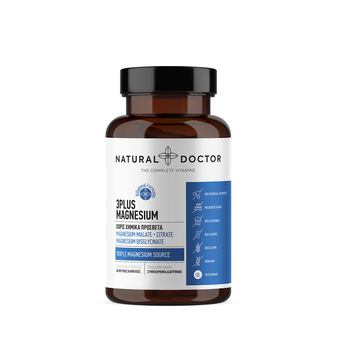Muscle energy, ATP and magnesium

Magnesium is one of the seven vital minerals the body needs in significant amounts. Although magnesium deficiency is the second most common deficiency, after D3 deficiency, its importance is often overlooked.
One mineral with many functions
Magnesium helps regulate critical functions in the human body. But its most important job is that it activates the healthy function of enzymes and is a co-factor in more than 600 enzyme reactions in the body. According to the World Health Organization, most Americans do not get the recommended daily magnesium intake.
Symptoms of magnesium deficiency
Magnesium is not synthesized in the body, and for that reason, magnesium deficiency is quite common. Symptoms of magnesium deficiency are:
- Muscle spasms and cramps
- Psychological disorders
- Osteoporosis
- Fatigue and weakness
- Arterial pressure
- Asthma
- Irregular heartbeat
- Difficulty sleeping
- Intestinal disorders
Magnesium and athletes
The body stores the most magnesium in bones and other soft tissues, such as muscles, so its availability is vital for athletes and people who exercise often. Studies have highlighted the importance of magnesium for athletes, as there is a low dietary intake of magnesium, especially in young athletes.
Even when athletes follow a balanced diet, which may cover the daily needs of other vitamins or nutrients, they may not get the recommended daily allowance of magnesium. In addition to inadequate intake, deficiency increases as magnesium is excreted through sweat in athletes.
Muscle energy, ATP and magnesium
Adenosine triphosphate (ATP) is an energy-carrying molecule known as "the energy currency of life" because it's the universal energy source for all cells. Every living organism, including humans, consists of cells that depend on ATP for energy.
ATP is made by converting the food we eat into energy. It's an essential building block for all life forms. Without ATP, cells wouldn't have the fuel or power to complete processes vital to remain alive, and they would eventually die. All life forms depend on ATP to do the things they must do to survive.
ATP is produced through a process called cellular respiration that occurs in the mitochondria of a cell. Mitochondria are little subunits within a cell that specialise in extracting energy from food and transforming it into ATP.
Magnesium is a critical factor in the production of ATP, which provides energy to muscles. ATP must bind to a magnesium ion to be biologically active. What is called ATP is often actually Mg-ATP.
Vigorous exercise dramatically increases the demand for muscle energy and activates a process that depends on magnesium for a continuous supply of ATP. Magnesium improves mitochondrial ATP synthesis, and creates greater ATP availability.
ATP contributes to optimal performance and faster recovery. Studies show that vigorous exercise increases the need for magnesium by up to 20 per cent. So magnesium levels should be proportional to an individual's physical activity level.
3plus magnesium
An advanced formulation with three types of magnesium malate, bisglycinate and citrate, 3plus Magnesium is optimized for high absorption and bioavailability. At least 3 capsules daily support the normal functioning of muscles, the nervous system and the metabolic processes to produce energy.



